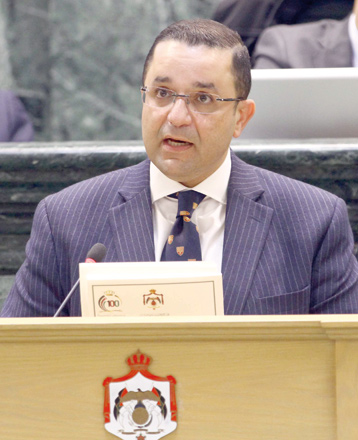AMMAN — The government on Sunday said that the estimates of expenditures and revenues in the 2021 state budget law and budgets of independent public institutions have been set according to “detailed studies and discussions”.
Replying to MPs’ remarks on the budgets, Finance Minister Mohamad Al-Ississ said that the government is currently preparing a plan for comprehensive health insurance through making the necessary constitutional amendments, the Jordan News Agency, Petra, reported.
Al-Ississ added that implementing the demands of lawmakers during the deliberations of the budgets would exceed the capability of the budget, noting that salaries of employees at public companies are controlled as stipulated in relevant laws and regulations, while public shareholding companies are governed by laws related to the private sectors.
The minister said that deputies’ remarks will receive the government’s attention, pledging to provide the Lower House with a report on the government’s procedures in response to parliamentary recommendations.
Jordan has been suffering difficult economic and financial conditions even before the COVID-19 pandemic, in addition to the regional instability that resulted in lowering growth rates and higher unemployment rates, with salaries, pensions and debt services accounting for the biggest share of the budget, he said.
Al-Ississ also pointed out that the decline in capital expenditures has negatively affected infrastructure projects. He said that indirect taxes, such as sales tax, constituted the biggest share of revenues, adding that the direct income tax could not meet the Treasury needs, which, consequently, contributed to a larger deficit and increased public debt.
Moreover, the pandemic deepened the crises facing the national economy, causing a drop in external trade, a decline in expatriates' remittances and a setback to the performance of the tourism sector compared with the great performance in 2019, Al-Ississ said.
The minister added that the top structural reasons for the decline in public revenues are the tax and customs exemptions granted to various sectors, companies and individuals, which did not achieve the envisioned benefits for the economy.
He added that these exemptions should be changed into incentives that can positively and directly reflect on the economy and contribute to addressing the unemployment and poverty problems.
The finance minister said that the 2021 budget has an increase of capital expenditures by 24 per cent, that is the biggest since 2014, with the aim to provide additional incentives for the economy, adding that the budget also included re-disbursing the salary raises of the civil and military sectors.
As for some MPs’ remarks on the possibility of achieving a real economic growth of 2.5 per cent in 2021 and on describing the budget as “optimistic”, the minister said that “the 2.5 per cent rate is not overly optimistic”.
The minister also acquainted lawmakers with the basic indicators that were considered in preparing the 2021 budget, including the growth of the nominal GDP by 3.8 per cent during the year, an increase of tax revenues due to the resumption of economic activities, a decline in the income tax due to the economic drop in 2020 and an increase in non-tax revenues due to the sustainability of economic activities.
